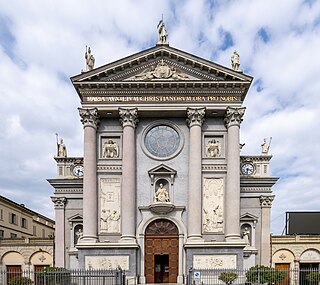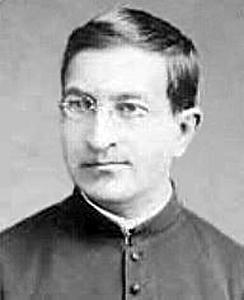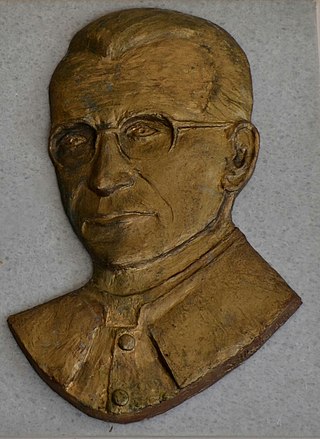Related Research Articles

The Salesians of Don Bosco (SDB), formally known as the Society of Saint Francis de Sales, is a religious congregation of men in the Catholic Church, founded in 1859 by the Italian priest John Bosco to help poor and migrant youngsters during the Industrial Revolution. The congregation was named after Francis de Sales, a 17th-century bishop of Geneva.

John Melchior Bosco, SDB, popularly known as Don Bosco, was an Italian Catholic priest, educator and writer of the 19th century. While working in Turin, where the population suffered many of the ill effects of industrialization and urbanization, he dedicated his life to the betterment and education of street children, juvenile delinquents, and other disadvantaged youth. He developed teaching methods based on love rather than punishment, a method that became known as the Salesian Preventive System.

The Salesian Sisters of Don Bosco, formally known as the Daughters of Mary Help of Christians are a female religious institute formed by Saint Maria Domenica Mazzarello in 1872. They were founded to work alongside Saint John Bosco and his Salesians of Don Bosco in his teaching projects in Turin. They continue to be a teaching order worldwide.

Don Bosco Technical Institute in Tarlac City, or simply Don Bosco Tarlac, is a private Catholic school for pre-school, grade school and junior high school boys. In 2016, it opened its co-educational senior high school department. The first Don Bosco school in the Philippines, it is the only academic-technical school in Tarlac. Its campus is located in Sto. Cristo, Tarlac City, Philippines.

Michele Rua was an Italian Catholic priest and professed member of the Salesians of Don Bosco. Rua was a student under Don Bosco and was also the latter's first collaborator in the order's founding as well as one of his closest friends. He served as the first Rector Major of the Salesians following Bosco's death in 1888. He was responsible for the expansion of the Salesians and the order had grown to a significant degree around the world at the time he died. Rua served as a noted spiritual director and leader for the Salesians known for his austerities and rigid adherence to the rule. It was for this reason that he was nicknamed "the living rule".

The Salesian Pontifical University is a pontifical university in Italy run by the Salesians of Don Bosco. It has three campuses, one in Rome, one in Turin, and one in Jerusalem. The Salesian Pontifical University is an ordinary member of the International Federation of Catholic Universities, the European Federation of Catholic Universities, the European University Association and the International Association of Universities.

The Basilica of Our Lady Help of Christians is a Pontifical church and Marian shrine in Turin, Italy. The building was originally part of the safehouse for poor boys cared for by Don Bosco, it now contains the remains of Bosco, and six thousand numbered relics of other Catholic saints.
A Salesian school is an educational institution run by the Catholic Salesian Congregation of Saint John Bosco, and one that uses his methods. Salesian schools are dedicated to young people in an educational and formative environment. According to promoters, a Salesian school is a home, church, playground, and school where students find a new way of life, and prepare for their future as good citizens of their country, while being faithful to their own religion.

Xavier College is a Catholic co-educational college north of Adelaide, South Australia, consisting of three campuses: Evanston catering for Reception to Year 6 students, Gawler Belt for Years 7–12 and Two Wells which will eventually cater for Reception to Year 12 students. The College was founded in 1995 and operates according to the traditions of the Salesians of Don Bosco. The school enrols approximately 2,000 students across all campuses. Its patron is the priest Saint John Bosco.

The Politecnica Salesiana University in Ecuador is an institution of higher education and Christian inspiration with Catholic character and a Salesian. The university is characterized by its opportunities for youth, especially from the poor sectors.

The Rector Major of the Salesians is the head of all institutes and superior general of the Salesians of Don Bosco worldwide. It is the title of a Catholic priest that is elected as the general superior of the religious institute Salesians of Don Bosco. He is also considered the successor of Saint John Bosco in the top guidance of his Salesian Order. The first general superior of the order was Don Bosco himself from 1874, the year that the order was officially created and its Salesian Constitutions approved by the Holy See, until his death in 1888. Since then, the Salesians have elected their Superior in the General Chapter for a period of six years. Between 1888 and 2014 there have been ten successors of Don Bosco, seven of them of Italian nationality, one Argentine, one Mexican and one Spaniard. Following the Salesian tradition from their Italian origin, the Rector Major is addressed as Don (Father).

Carlo Braga was a Salesian religious priest. He is also sometimes known as "the little Don Bosco of China" for his missionary works towards the children in China. He died in the Philippines in 1971.
The Association of Salesian Cooperators (ASC) is a lay association in the Catholic Church and the third order of the Salesians. It is also one of the three main branches of the Salesian Family founded directly by Don Bosco in 1876. The movement was created with the purpose to share the ideals of the Salesian Preventive System in the education of young people, especially those who are poorest.
The Salesian Bulletin is an official publication of the Salesians that was founded in August 1877 by Don Bosco. It has been published without interruption since then. The purpose of the Salesian Bulletin is the proliferation of the educational works of Don Bosco all over the world. As for 2010, the Bulletin was published in 56 different editions and 29 languages for 135 countries.

Margherita Occhiena Bosco was the mother of John Bosco and worked with the poor and the less fortunate. Pope Benedict XVI proclaimed her to be venerable in 2006.

Pascual Chávez Villanueva SDB is a Roman Catholic priest of the Salesians of Don Bosco, who was Rector Major of that Order between April 3, 2002 and March 25, 2014, being the 9th successor of Don Bosco, the first Mexican to get such position and the second Latin American after Argentinian Juan Edmundo Vecchi. During the 26th General Chapter of the Salesians in Rome in 2008 he was confirmed for a second period, being the last Rector Major who could be reelected, because that same Chapter ruled that a Rector Major would not be reelected afterward.

Filippo Rinaldi was an Italian Roman Catholic priest and a professed member from the Salesians of Don Bosco; he served as the third Rector Major for the order from 1922 until his death in 1931. He founded the Secular Institute of Don Bosco Volunteers. Rinaldi was close friends since his childhood to Giovanni Bosco and Paolo Albera and it was Bosco who guided Rinaldi who was torn in his adolescence between the farming life and the religious life. The order held him in high esteem from the outset and noted the potential within him as well as seeing the charism of Bosco encompassed in Rinaldi.

Leonardo Murialdo was an Italian Roman Catholic priest and the co-founder of the Congregation of Saint Joseph - also known as the Murialdines. Murialdo's call to the priesthood did not manifest until late in his education in Savona; he pursued his ecclesial studies and was ordained as such in 1851 before dedicating himself to social work alongside the poor and with adolescent men. This put him into contact with other priests of the era such as Giovanni Bosco and Giuseppe Cafasso who held Murialdo in great esteem. His zeal for social concern saw his frequent calls for an end to worker exploitation and the granting of further rights to workers in factories.

Bronisław Markiewicz, SDB was a Polish Roman Catholic priest and a professed member of the Salesians of Don Bosco. Markiewicz established the Congregation of Saint Michael the Archangel that devoted itself to the principles and teachings of John Bosco under the patronage of Saint Michael the Archangel.

Titus Zeman was a Slovak Roman Catholic priest and a professed member of the Salesians of Don Bosco. Zeman studied in Italian cities prior to his ordination and worked in Slovakia to protect fellow Salesians after the communist regime outlawed religious orders. He was arrested after attempting to send Salesians out of the nation and was imprisoned from 1952 until 1964 and died due to poor health sustained from the prison conditions. He has been acclaimed as a defender of religious liberties.
References
- 1 2 Society of Saint Francis of Sales (1877). Regolamento per le case della Società di S. Francesco di Sales. Tipografia Salesiana, OE XXIX. pp. 3–13.
- ↑ cite web |url=https://donbosco.org.ar/uploads/recursos/recursos_archivos_1862_724.pdf
- ↑ Nanni, C. (2003). Il Sistema Preventivo di Don Bosco. Elledici. p. 7.
- ↑ Lemoyne, Giovanni Battista (1965). The Biographical Memoirs of Saint John Bosco. Salesiana Publisher, INC.